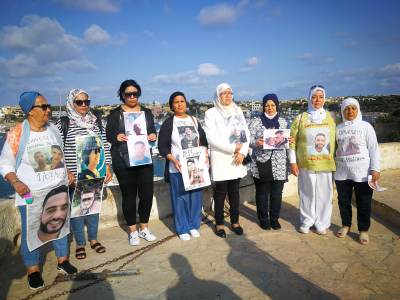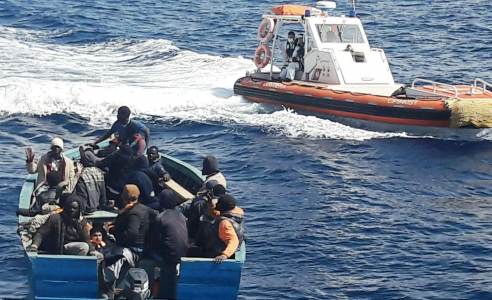Jusqu’au bout: Tunisian women against the border regime
Article first published on November 9, 2021
Tunisian women, relatives of missing migrants, play an essential role in recording and denouncing activity in the Mediterranean.
A delegation of eleven Tunisian women, mothers and sisters of deceased and missing migrants in the Mediterranean, crossed the ocean and traveled to Sicily and Lampedusa between the 2nd and 7th of October to denounce immigration policy and search for lost loved ones.
“We are Awatef, Fatma, Gamra, Jalila, Leila, Hajer, Marwa, Nourhene, Samia, Sana, Sarra. We are mothers, sisters, daughters of the dead and the missing in the Mediterranean, and we are here, too, in the names of many other women and families,” they declared from the Mediterranean rock of Lampedusa.
It is the first time such a large delegation of relatives of victims of the border regime has visited Lampedusa and Sicily: the mothers and sisters of Hedi, Mehdi, Akram, Bechir, Ramzi, Mohamed, Fedi, Hamdi, Adel, and Lazhar also submitted requests in the names of other mothers and relatives who could not be present. Accompanying them were various Italian and international associations that supported the women during their trip, among them Carovane Migranti, Accoglienza Controvento, Rete Antirazzista Catanese, Borderline Sicilia, LasciateClEntrare, Forum Lampedusa Solidale, Ongi Etorri Errefukiatuak.
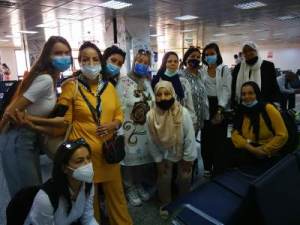
Photo by Silvia Di Meo
The Trip to Sicily and the Blankets of Remembrance
In Lampedusa and Sicily, the Tunisian women interwove their personal and shared experiences of the Mediterranean with those of activists, civic society, relatives of other victims of the border crisis – but also with NGOs that operate rescues at sea such as Sea Watch and ResQ, which lent their support and met them at the Porta d’Europa (Gate of Europe), where they reflected together on the importance of providing testimony to what they’ve witnessed at sea.
The women were also able to undergo important genetic testing, taking a sample of their DNA and providing necessary data for their searches and the identification of bodies buried in local cemeteries. Among these is the cemetery of Lampedusa, where names are restored to those lost in the Mediterranean, transforming the remains of a treacherous sea – where so many lives remain submerged – to a place of remembrance in defiance of death.
In Cefalù, the women visited the grave of Akram, a migrant who perished in a shipwreck in November 2017. Thus Marwa, the sister of the boy, was finally able to pray in the place where her brother was laid to rest. On October 6th – the anniversary of the death of Lazhar, Gamra’s son – the women tossed flowers into the sea in his name and in the names of all victims of the border crisis. It was an intense moment for all, full of pain but also of strength and solidarity, acknowledging that to celebrate those lost at the border is an act of resistance against an apathy that costs lives.
United around the blankets of remembrance – the Couverture de la Mémoire and the sheet embroidered with names of the missing – the Tunisian women assembled hundreds of colorful crochet squares, each representative of a migrant’s life, retracing the stories of those who took the dangerous route by sea because they were denied the option of a safe, regulated journey. “The blanket of remembrance from Tunisia was created with the aim of preventing indifference from erasing the responsibilities that come with these deaths. To turn the telling of these stories into a means of countering the violence of the border. To make memory an instrument of collective struggle,” states the manifesto of Tunisian women.
Woven into the blanket are not only the stories of the young Tunisians who made the perilous illicit crossing, but also other migrants’ stories: for example, that of sub-Saharan minors Abdou and Abdallah, who were killed by the mismanagement of the quarantine ships; that of Musa Balde, who died in a detention center; and also lesser known stories, such as that of Djara, a young Guinean who drowned by shipwreck off the coast of Sfax last June.
In this sense, the weaving of the blanket is the symbol of a network of care and solidarity that is reinforced at each side of the sea and the world. Indeed, from distant Central America – where in recent weeks the Caravana de Madres de Migrantes Desaparecidos was in progress – solidarity from the mothers of the Puentes de Esperanza project arrived. They are searching for their missing children on the journey to the United States, accompanied by Movimiento Migrante Mesoamericano and Pax Christi; they also worked on the “Manta de la Memoria”, embroidering the names of the countless disappeared.
Online, Tunisian and Central American mothers were able to meet virtually: “We are together in this global fight against the border system,” they said, sharing their stories and commitment, their criticism of the visa system and global policies that curb movement from south to north.
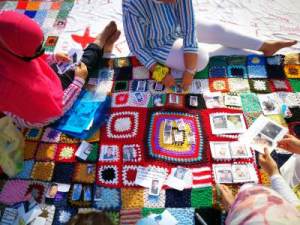
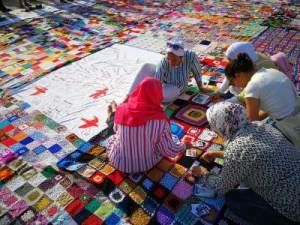
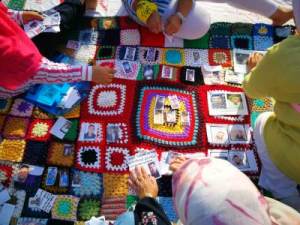
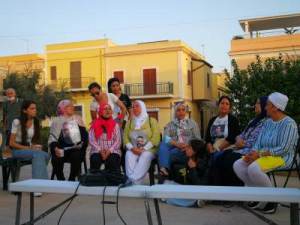
If we do not fight for truth and justice, we lose these memories
The border regime is made up of discourses, practices, and policies that not only negate human life, but also de-legitimize the process of seeking justice, and systematically remove recognition of historic truth.
“Where is Fedi? It is my right to have answers.”
“Where is Hamdi? I will look for him until the last day of my life,” say Samia and Awatef, who have spent the last few years searching for their lost loved ones, who disappeared in 2021 and 2020. “We have been fighting for ten years against the indifference of governments, we want to know the truth,” said Hajer, who lost her two sons, Mohamed and Bechir, in 2011.
“I ask the governments: does this seem right to you? How long must we wait? You are killing us, too,” says Leila, the mother of Yussef. Indeed, the violence of the border regime does not end with nameless bodies but is carried on to those who live on waiting for the truth. Those who have looked into the eyes of these mothers and sisters and listened to their voices have seen the violence of borders: it is there, clearly visible, the torture of this system, rooted and embodied in the people who live with the suffering produced by necropolitics.
It is an underestimated and socially naturalized violence; it is a violence institutionally silenced and obscured by governments that prolong a state of ignorance useful for concealing political responsibilities.
On this subject, in the area of Moltivolti in Palermo, the Tunisian women had a significant meeting with lawyers and associations that have been supporting families of the disappeared for years. Together, they discussed how to grant families easier access to filing missing persons reports through standardized procedures, and to legal assistance that provides effective intervention solutions to identify and repatriate the bodies of migrants. It was an important step towards building an international family support network that counts on the commitment of Italian and Tunisian associations and legal teams.
“We have accomplished more in these five days than in ten years of appeals to the European and Tunisian governments” Fatma, president of the Association of Mothers of Disappeared Migrants, said at the end of the day – she has been looking for her son, Ramzi, since 2011.
This reflects a commitment that should be institutionalized but has instead had to rely on the joint efforts of associations and families – in particular of mothers, who play a fundamental role – within spaces of female solidarity and on grassroots efforts in search of justice. It has relied, too, on sisters – such as Nourhene, Sarra, Soumaya, Sana and Marwa – who with their own means and resources do not submit to the widespread naturalization of these deaths and disappearances.
“We denounce the visa policy so people will stop drowning at sea. It is critical that we continue, for two reasons: to know the truth about our children, and so that those responsible for the tragedies are held accountable,” say the Tunisian women, exhibiting photographs of the missing, displaying their names on Sicilian ports, giving interviews to journalists and publicly protesting.
Jalila – who started the women’s group for the Memory Blanket of Tunisia – declared before the Tunisian Ministry of Foreign Affairs: “We ask for de-criminalization on the Mediterranean for all migrants who leave, so that they can have the right to move freely.”
This is the living and active memory. Because there is no memory without a search for truth and justice.
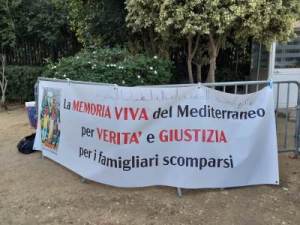
Photo by Silvia Di Meo
Where are our children? Where are our brothers?
“We ask the Municipality of Lampedusa to help us in giving names back to the unidentified bodies buried in the cemetery of the island. Over the years, numerous shipwrecks have tragically left a trail of bodies that are lifeless, too, in the records of many Sicilian cemeteries. Among these, seemingly confirmed by in-depth research, are some bodies from the shipwreck of 6 September 2012, which took place off the islet of Lampione, that have been buried in the local cemetery.”
“We ask Italy and Europe to retrieve the bodies of the nine migrants identified at a depth of 80 meters near the island of Lampione, victims of the recent shipwreck of 30 June. A few miles from that place we have launched an appeal to the conscience and humanity of Italian and European civil society. We, Tunisian mothers and sisters, cry out loudly in the names of their families: give them a burial, give them a name, let us bring them back to their community!”
From the shipwrecks of 2012 in Lampione, to those of 2021 in Lampedusa and Pantelleria, Tunisian women have presented an appeal with specific requests, recalling that the remembrance of these massacres is not an occasional act of commemoration of the past but a daily practice, an exercise of the present.
May the island of Lampedusa and Sicily, the Gateway to Europe, become a place where the mothers of the disappeared along the migratory routes can meet annually to share their findings and struggles, as well as tools to find the truth and bring dignity to the lives of our missing relatives, bring justice to the communities… This is the wish they have cast for the Mediterranean.
In fact, surrounding the dead and the disappeared is so much life that pulsates, that moves, that protests, that defies. Because remembering is a responsibility to those who are no longer here but also to those who survive.
As Ana Enamorado – mother of the late Oscar Enamorado and a well-known activist in Mexico for the search for the disappeared – has said: “I never go out looking for the dead, mine is a search for the living.” Likewise, the search undertaken by Tunisian mothers is for those who remain, for the protection of the right to travel – whichh is a right to life and personal and collective freedom.
Freedom of Movement in the Mediterranean
Just beyond the sea, Zarzis activist Chamseddine Marzoug is known for having built the “Cemetery of the Unidentified” on the Tunisian-Libyan border, where for decades bodies of migrants have arrived nameless, as is the case in Lampedusa and Sicily. Together with the fishermen who denounce the raids and violence at sea by the Libyan militia against Tunisians and migrants, Chamseddine opposes this political and human barbarism.
His principles materialized on the Sicilian shore: just a few days ago, in an artistic installation in Palermo as part of the “Between Land and Sea” Festival at the Ecomuseo Urbano Mare Memoria Viva, project DEAL by Sicilian photographer Francesco Bellina was exhibited, reproducing two large photographs emblematic of the relations between Tunisia and Italy.
Displayed in the installation was a photo taken by Chamseddine at the grave of Rose Marie, a Nigerian migrant who perished in a shipwreck, next to another photograph immortalizing hundreds of containers of Italian refuse that arrived safely in Sousse, Tunisia: an eloquent juxtaposition that challenges the different value placed on free circulation of goods and people, in a world where the profit of the neoliberal system prevails over human dignity and rights.
From the deep Tunisian south to the deep south of Europe: this work shows how within the Western logic of colonization and economic-political dominance, the victims of the border regime – who must overcome the walls built to contain exodi caused by the system itself – are worth less than merchant waste and considered no more than a side effect.
For this reason, in the face of the lethal infrastructure of the border regime – from agreements with third countries to the strengthening of the hotspot resources – to reevaluate the critical role of Euro-Mediterranean subjects (from rescuers to fishermen, from Tunisian mothers to researchers/activists) means subverting and thereby opposing the functioning rhetoric of confinement and the politics of death.
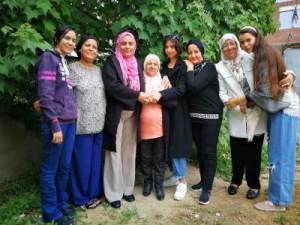
Photo by Silvia Di Meo
Jusqu’au bout – until the end
Before leaving Sicily, the Tunisian women made a pact: Ensemble jusqu’au bout was the promise that mothers and sisters made hand in hand. Jusqu’au bout: until our goal is met, until the end. A pact of unity to continue together until the truth about those who went missing on their way to Europe should finally emerge. With the same intention, the mothers and families of the disappeared of Central America say “Hasta Encontrarles”, until they are found, in reference to loved ones who have gone missing on the migratory route.
A promise full of hope and justice, but also of reciprocal support, mutual care.
“Jusqu’au bout is our symbol,” explained Jalila, “and it is for this that we will continue to bridge the shores of the sea.”
And so the pledge of these women from Tunisia, in defense of the rights of migrants, must be encouraged and supported. If oblivion supports the foundations of the border system, remembrance is undoubtedly the instrument for breaking this violent regime.
In this sense, the mothers and sisters of migrating people are the guardians of an alternative history.
Above all, their active presence on the border is a warning to the institutions on both sides of the sea: the struggle of the women of the Mediterranean cannot be stopped and will continue to demand justice.
Jusqu’au bout.
Silvia di Meo
Borderline Sicilia, Carovane Migranti, Accoglienza Controvento, Rete Antirazzista Catanese, LasciteCIEntrare, Ongi Etorri Errefukiatuak
Translated from the Italian by Olivia Taibi

